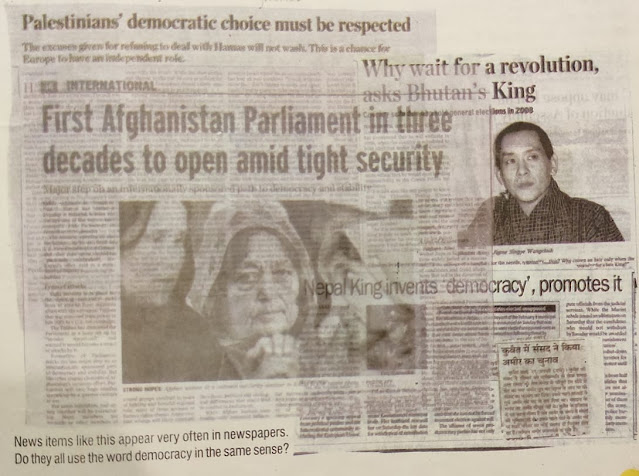6 Class.Civics.CW/HW.Chapter21.Our Community Life.
Chapter 21
6 Class.Civics.CW/HW.
Chapter21.Our Community Life.
6 Class.Civics.CW/HW.
Chapter21.Our Community Life.
Keywords
basic amenities : simple facilities like drinking water pollution free environment.
Bonded labor : a practice in which employers give huge interest loans to workers whose entire family then labor at low wages to pay off the debt
Industrilisation : the procew in which a society or country for world) transforms itself from a primary agricultural society into one bused on the manufacturing of goods and services. Interdependence : depending on one another for folniment of one's need!
untouchability an evil practice of considering or treating some people in the society ws untouchables or outcaste,
basic amenities : simple facilities like drinking water pollution free environment.
Bonded labor : a practice in which employers give huge interest loans to workers whose entire family then labor at low wages to pay off the debt
Industrilisation : the procew in which a society or country for world) transforms itself from a primary agricultural society into one bused on the manufacturing of goods and services. Interdependence : depending on one another for folniment of one's need!
untouchability an evil practice of considering or treating some people in the society ws untouchables or outcaste,
Something to Know A. Tick (M) the correct option.
1 The smallest unit of community life is
(a) a village.
(b) a family
(c) a school
(d) a child.
1 The smallest unit of community life is
(a) a village.
(b) a family
(c) a school
(d) a child.
2. It is very essential to keep
the environment
(a) light and bright.
(b) clean and green
(c) dry and wet
(d) hot and cold
3.Economic development has made villages and towns
(a) close to each other.
(b) distant from each other.
(c) independent of each other
(d) rivals of each other.
(a) light and bright.
(b) clean and green
(c) dry and wet
(d) hot and cold
3.Economic development has made villages and towns
(a) close to each other.
(b) distant from each other.
(c) independent of each other
(d) rivals of each other.
4. Which one of the following
festivals is not a harvesting festival?
(a) onam
(b) baisakhi
(c) diwali
(d) pongal
5. The Directive Principles of State Policy are helpful in achieving our national goal like
(a) secularism
(a) onam
(b) baisakhi
(c) diwali
(d) pongal
5. The Directive Principles of State Policy are helpful in achieving our national goal like
(a) secularism
(b) economic justice
(c) population control
(d) education for all
B. Fill in the blanks.
1 Several families living close to one another form a
2. Community life promotes a feeling of
3. Depending on one another is called
4. Education makes us a good
5. India is mainly a land of
1 Several families living close to one another form a
2. Community life promotes a feeling of
3. Depending on one another is called
4. Education makes us a good
5. India is mainly a land of
C.Give one word answer to the following
1 Name the first school of
a child
2. Name the harvest festival of Tamil Nadu.
3. What makes the fulfillment of our needs
possible?
4 What forces the villagers to
migrate to towns and cities? S Which
factor has diluted the impact of India's economic progress
D. Answer the following
questions in brief
1. What values does our
family inculcate in us?
2. How does
school help us in our development?
3.
How did economic interdependence begin in a community?
4. List any four essential services generally
required by rural as well as urbon communities.
5. Name the main factors responsible for Green Revolution in India
E.
Answer the following questions.
1. How
did the community life 'begin?
2. How
does the cultural exchange help in community development?
3. Distinguish between the rural and urban
communities
4. Highlight the factors that make the citylife in India very
difficult
5. State the provisions given in the Indian Constitution which aim at
bringing equality
Value Based Question
Anurag is a student of DAV Public
School, Dhanbad, Bihar. One day, he found his best friend Shivam
crying because his father was in the hospital and needed blood urgently. After the school, Auror went with Shivam and
donated blood. When he reached home and
told everything to his parents, they scolded him for what he had done.
1. How far do you agree with Anurag's parents?
2. What will you do if you get a chance to
donate blood in such a situation and why?
Map Skill
on an outline political map of India, locate and label
the following:
(a) Any two North Indian states where Green evolution took
place. - Uttar Pradelen link
(b) The state
where Pongal is celebrated. - Tamil Nadu
(c) The state to which Dihu dance lo
associated with a
(d) The state known for Onam festival. Kala
Something To Do
1. Make a list of problems caused by
over population. Hold a group discussion in the class to find out solutions to
these problems
2. Listten ways in which your family helps you, in return, what
can you do for your family?
3. Cite examples of unity in diversity in your day to day life,
4. Hold an exhibition in the
school where the stalls should represent different states of India showing
food, dresses, dance forms and varieties of natural vegetation and wildlife,
.

Comments
Post a Comment